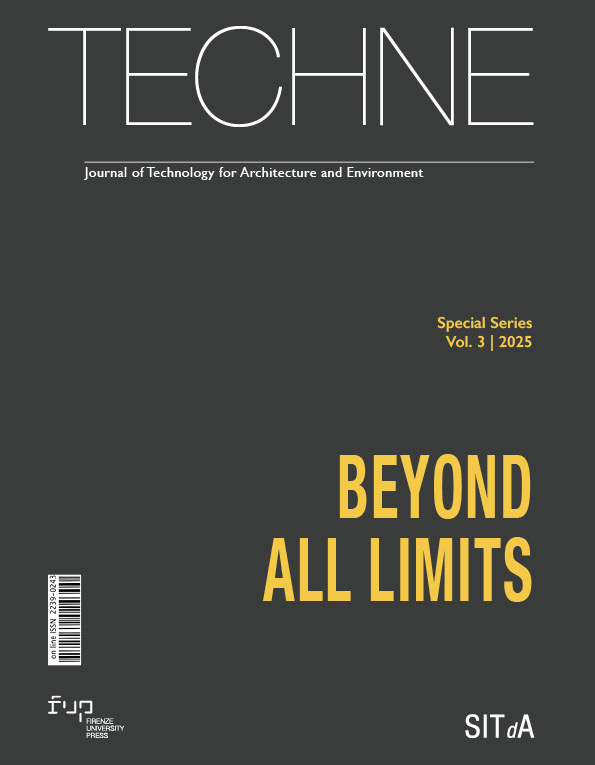Published 2025-07-31
Keywords
- Architecture,
- superblock,
- street,
- commonplace,
- open city
How to Cite
Copyright (c) 2025 Marco Russo

This work is licensed under a Creative Commons Attribution 4.0 International License.
Abstract
The paper presents a series of reflections on the street as a place for relations, a significant aspect of European city design. This ‘new’ approach focuses more on interaction and the active use of outdoor spaces, starting from criticism of some solutions proposed by the Modern Movement by Team 10 members. However, this design vision has recently gained significant traction, marking a notable shift in European city redevelopment. The text explores the concepts behind public spaces where the interaction between inside and outside is becoming less distinct.
Downloads
References
- Anderson, S. (1978), On Streets, MIT Press, Cambridge, Massachusetts, US.
- Badia, J. (2020), “Context”, TC Cuadernos, n. 144, pp. 12-13.
- Capozzi, R. (2019), “Mies “Master builder” of monuments: The Seagram building 375 Park Avenue NYC”, AIÓN, n. 22, pp. 118-127.
- Colomina, B. (2018), X-Ray Architecture: Modernism and Tuberculosis, Lars Müller Publishers, Zurich, Switzerland.
- Curtis, W.J. and Doshi B. (1989), “Il piano di Vidyadhar Nagar, la nuova Jaipur, di Balkrishna Doshi, Casabella, n. 558, pp. 42-57.
- Evenson, N. (1966), Chandigarh, University of California Press, Berkeley, California.
- Giedion, S. (1928), Bauen in Frankreich, Bauen in Eisen, Bauen in Eisenbeton, Klinkhardt & Biermann, Berlin, Germany.
- Gregotti, V. (1989), “La strada: tracciato e manufatto”, Casabella, n. 553-554, pp. 2-5.
- Jacobs, J. (1961), The Death and Life of Great American Cities, Random House, New York.
- Jencks, C. (1973), Modern Movements in Architecture, Anchor Books, New York.
- Karssenberg, H. et al. (2012), The city at eye level. Lessons from street plinths, Eburon, Delft, Netherlands.
- Le Corbusier (1923), Vers une Architecture, G. Crès et Cie, Paris, France.
- Le Corbusier (1965), Maniera di pensare l’urbanistica, Laterza, Bari, Italy.
- Nicolin, P. (2017), “After the Grands Ensamble”, Lotus, n. 163, pp. 46-53.
- Norberg-Schulz, C. (1979), Genius Loci, Towards a phenomenology of architecture, Rizzoli, New York.
- Pérez de Arce, R. (2018), City of play: an architectural and urban history of recreation and leisure. Bloomsbury, London, UK. DOI: https://doi.org/10.5040/9781350032187
- Pizzigoni, V. (Ed.) (2010), Ludwig Mies van der Rohe. Gli scritti e le parole, Piccola Biblioteca Einaudi, Turin, Italy.
- Rasmussen, S.E. (1964), Experiencing architecture, MIT Press, Boston, Massachusetts.
- Secchi, B. (1986), “Progetto di suolo”, Casabella, nn. 520-521, pp. 19-24 .
- Sennett, R. (2019), “The Open City”, Lotus, n. 168, pp. 117-127.
- Smithson, A. and Smithson, P. (1967), Urban structuring: studies of Alison & Peter Smithson, Studio Vista – Reinhold, London.
- Venturi, R. (1966), Complexity and Contradiction in Architecture, MOMA, New York. DOI: https://doi.org/10.2307/1566911
- Wright, F.L. (1945), Architettura organica. L’architettura della democrazia, Muggiani, Milan, Italy.
- Zevi, B. (1974), Poetica dell’architettura neoplastica: il linguaggio della scomposizione quadridimensionale, G. Einaudi, Turin, Italy.






